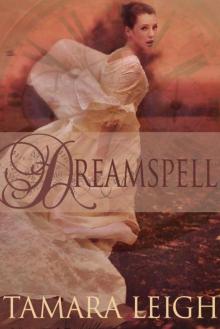- Home
- Tamara Leigh
THE RAVELING Page 2
THE RAVELING Read online
Page 2
“What sort?”
“Whilst setting out a babe some years before, my grandsire was approached by one who offered to pay him for all those destined to breathe their last in the wood.” He raised a hand to keep Elias from speaking. “He agreed, as ever it was with heavy heart he did what needed doing and he was certain whatever their fate it was better than death by abandonment. A decent man he was. Now what she does with those babes…”
A woman then, but for what purpose did she buy undesirables?
“I pray…” Arblette’s voice caught, and he gripped his hands atop the table as if to address heaven. “I pray the Lord forgives my grandsire and me for whatever part we played in that woman’s ungodly schemes.”
Chill crept through Elias. He was not superstitious—rather, not foolishly so—but he knew there was evil in the world eager to manifest itself through weak men and women, whether they acted on behalf of the devil or in their own interest.
Arblette looked up from white-knuckled hands. “Though in the beginning my grandsire thought her intentions good, that she provided for the babes as best she could, he began to suspect she was sent by the devil to claim his brood and those whose only sin was of being born of poverty and shame.”
He believed she gave the babes to the devil? Through sacrifice?
Now it was Elias who addressed heaven. Lord, not that. Heart making its beat felt, he said, “What roused his suspicion?”
“Ever she denied him her name. Ever she kept her face hidden. Ever she appeared within hours of him marking the tree beneath which he was to leave a babe.”
“How was the tree marked?”
“As instructed, a rope tied ’round its trunk.”
Elias jutted his chin. “What else?”
“Were she not walking hand in hand with the devil, she would have to dwell near to daily pass that portion of the wood to verify the rope was present, and only once a month—more usual every other month—the tree was marked. And yet ever she appeared when summoned, and for all the babes given into her care over the years, there is no evidence of her or them in these parts.”
“No others have seen her?”
“Only my grandsire and I.”
Elias narrowed his eyes. “Once he suspected her intentions, why did he continue selling her babes?”
Arblette raised his palms apologetically. “Not being of a superstitious nature, I dissuaded him from such thinking. And when I began to believe as he did, I reminded myself—and him—the undesirables were destined for unconsecrated ground. Thus, already their souls were lost.” Moisture gathered in his eyes. “It was selfish, but her coin put more food in our bellies, better clothed us, and made the lean winters more bearable.”
Elias wondered how much was truth and how much fiction. And hoped the latter was heavily weighted, that this was an act to gain more coin. Not only did the life of the boy who might be his son depend on it, but the lives of other innocents.
“I would speak with your grandsire.”
Arblette blinked. “Did I not say? A slow sickness laid him abed two years past, and a year later I put him in the ground. God have mercy on his soul.” He touched a hand to his heart. “Hence, the business is mine.”
“You call it a business?” Elias struggled with anger so sharp he hardly knew himself—he who preferred to laugh, tease, riddle, and arrange words pleasing to heart and soul.
“What else to call it, milord? A business it was, and a fair good one with coins from the wretched mothers one side and coins from the faceless woman the other side.”
“Was? It is no longer your business?”
Arblette winced. “Still I perform a much-needed service, but no more do I take coin from the one who paid me better than the mothers.”
“Why? Have you now proof of those babes’ fate rather than mere suspicion?”
Arblette rubbed his temple as if pained. “The last time I delivered a babe to—well, let us call her what she is—the witch, I prayed for the Lord’s protection and followed her, and what I saw…”
“What did you see?”
“I did not stay for all of it. I could not, it grieved and frightened me so, but ’twas an unholy ritual. She danced around a fire in the wood, chanted, and held the babe aloft as if in offering. I vowed then to never again summon her no matter how great my need for coin. And I have not these three months, though my purse is hardly felt upon my belt.”
Elias continued to watch him closely, well aware among his own shortcomings was gullibility resulting from the need to believe the best of others. It was the poet in him…the teller of tales…the composer of songs. But as for the actor in him, that side was of little use in determining if this man he hardly knew wore a face not his own.
“You think all the babes dead?” he asked.
“I do not. Though surely a great many have been consigned to the dirt, methinks some rove amongst us in search of good Christians to enlist in service to the devil.”
Vile superstition, but therein the possibility the babe, who would now be a boy, lived. A boy in need of a father.
Arblette leaned farther across the table. “Most unusual twins were born in our village a year past. Joined they were—here.” He tapped his chest. “Though sickly, I gave them into the care of the witch thinking they would be comforted as life left them. Then, not long ago I heard rumor such babes are exploited by a troupe of performers who charge to look upon the spectacle, and for it King Henry has ordered their company to leave England.”
“You believe the woman sold them?” Elias said through his teeth.
“I know not what to believe, but it makes one question if the babe I gave—”
“Sold!”
The man lowered his chin, nodded. “Now I wonder if ’tis a business for her as well and what other babes suffer that fate. If your son…” He fell silent, providing time in which to imagine Lettice’s babe exploited for his marked face.
Elias wished the man would look up so his emotions could be read, but when finally he did, he went behind his tankard and drained its contents.
“I must know more about the woman,” Elias said.
Arblette tapped the table. “As told, my business is not as lucrative as it was.”
Elias removed two more coins and pushed them to the man who swept them into his palm.
“I know not her face.”
“As already told.”
“I know not her name.”
Elias glowered.
“I know not whence she hails.”
“But you know how to summon her to dispose of babes,” Elias growled.
“True, but do you recall, I vowed never again to do so no matter how much she offers.”
“What of my coin?”
Arblette raised his eyebrows, motioned to the serving girl. “All this talk makes me dry.”
Grudgingly, Elias waited as the knave’s vessel was refilled. This time Arblette pinched the girl, eliciting a squeal.
Seemingly unconcerned by the anger leveled at him by the innkeeper, Arblette said, “What do you propose, milord?”
Elias set before him a purse of a size slightly larger than the one given Lettice, this one holding a quarter of his remaining coin. “Half now, half when you deliver the woman to me.”
Arblette stared at the offering. “May I?”
Elias loosened the strings and spread the leather to reveal the contents against a silken red lining.
Arblette whistled low.
“Agreed?” Elias said.
“I can but summon the witch under pretense I have another babe to dispose of.” He raised his eyebrows. “’Tis for you to capture her ere she disappears in a sudden fog—which she does sometimes. I would not have the wrath of one such as that fall on me, especially as I am no mighty warrior as your blade proclaims you to be.”
The Wulfrith dagger on his hip, worn not only as a matter of pride but to warn any who thought to set upon its bearer.
“When I have her in hand,” Elias said
, “you shall have the second half of your coin—though no clearer conscience if you continue to believe the Lord approves of leaving his loveliest creation in the wood to die.”
“Loveliest…” Arblette snorted. “You may say that of babes merely unwanted for poverty’s sake, the lack of food taking them a bit later than were they left to the wood, but you cannot say that of those sinful creatures born out of wedlock and abominations come forth with misshapen heads and bodies and marked faces.” He nodded. “I do the Lord a service.”
Who crawls beneath my skin? Elias wondered. Not even when foul trickery caused him to yield Lady Beata Fauvel—now Marshal—to an unwanted marriage had he so longed to harm another. Prayer was what he needed. And assurance the boy he may have fathered was not in need of rescue.
He cinched the purse, shoved it at the man. “Summon her.”
Chapter 3
HERE BEGINS A TALE
Six months. They felt like years.
Honore of no surname lowered her forehead to the floor. Gripping her beads, she prayed, “Almighty, You are all. You see all, hear all, feel all.” She drew a shaky breath. “You can do all. I beseech Thee, wherever Hart is, turn him back. Deliver him to these walls unharmed and smiling his sweetly crooked smile. Bring him home.”
To give the Lord time to consider her request in the hope He would finally act on it, she waited some minutes before setting before Him others in need of grace and healing.
When the bells called the sisters to prayer an hour later, she pressed upright. Soon the chapel would fill with holy women, one of whom Honore was not and would never be. She engaged in work of a different sort—of equal import, possibly greater.
She stepped out the side door and paused to allow the sun’s heat burning away the clouds to warm places grown cold whilst she prostrated herself. It felt wonderful, tempting her to delay her duties, but she was too long gone and Lady Wilma had been generous enough with her time.
Honore bounded down the steps and headed around the rear of the chapel to sooner reach the dormitory. And halted a step short of colliding with a squat nun.
“Forgive my recklessness, Sister Sarah.” She nodded deferentially. “I am late to—”
The nun raised a staying hand, and when Honore seamed her mouth, tapped her own lips.
“Dear me!” Honore gasped, belatedly realizing how loudly she had spoken, in the habit as she was of compensating for a muffled voice whilst moving about the abbey grounds. She drew up the thick linen cloth draped against her neck which respect for the Lord—and the abbess’s assurance He thought her beautiful—made her lower before addressing Him in His house.
“I was at prayer,” she said as she arranged the gorget not over chin as most often done by those of the abbey but over mouth. “In my haste to relieve Lady Wilma, I neglected to set myself aright.” She reached beneath her head veil and adjusted the gorget’s ties at the back of her crown to ensure the covering did not slip. “I thank you, Sister.”
It was not cruelty that bade the nun remind the younger woman of what was best kept concealed. It was kindness, Sister Sarah well-acquainted with the superstitious at Bairnwood, especially those who resided within the convent due to advanced age, a babe whose birth must be concealed, or to escape an unwanted marriage. The most disapproving of these nobles was the elderly Lady Yolande whose generous gifts to the abbey bent Abbess Abigail to her will—that will being to keep from sight as much as possible those unfortunates she believed born beneath a moon across which the devil cast his shadow.
“Tell, Honore,” Sister Sarah said, “how fares your good work?”
“Well, Sister.” It was true, though it felt otherwise these six months.
The nun inclined her head. “I pray thee a good day.” She sidestepped and continued to the chapel.
Resuming her course to the dormitory, Honore muttered, “You must cease this grieving. It does him no good. It does you none. Hart is gone. Pray for him and leave him to the Lord who can protect him far better than you.”
Easy to say. Difficult to do. The loss of the boy hurt deeply, and worry over him nibbled at her every edge. If she did not gain control of her emotions, she might find herself eaten all the way through.
Honore jumped out of the path of a cluster of nuns also destined for the chapel. As they passed, she fell beneath the regard of a middle-aged woman bringing up the rear, one not yet garbed as a bride of Christ. But soon, the novice’s family having supplied funds to make a place for her at Bairnwood.
Honore held the woman’s keen gaze, refusing to be cowed by one who was her equal—or nearly so. Had Honore wished to become a nun, for a dozen years now she would have worn a habit. Instead, she had been permitted to use the monies paid for her keeping in a way surely as pleasing to the Lord.
As the novice neared, she shifted her eyes to the gorget concealing the bottom half of Honore’s face, then lowered her gaze further.
Honore closed a hand around the short string of prayer beads usually tucked into her bodice. As noted months past, it was similar to the ones hung from the girdle of the novice who moved past her.
Slipping the beads beneath the neck of her gown, Honore continued to the farthest dormitory which housed the abbey’s female lay servants.
As soon as she entered the building whose northern end had been converted from a dozen individual cells into one great room a decade past, Lady Wilma hastened forward. “Settle yourselves, children,” she called over her shoulder, “else no honey milk with your dinner.”
As groans and mutterings answered her, Honore noted the woman’s anxious eyes. “What is amiss, my lady?” she asked as she lowered the gorget beneath her chin, it being unnecessary in this blessed place where all were accepted regardless of what the world deemed imperfection.
The woman halted. “That raggedy lad was here.”
Honore drew a sharp breath. She had hoped not to see Cynuit again, that the abbey’s plans to render the boy’s master useless would be completed before she was called upon to once more leave the safety of these walls.
“His master bids you meet him two hours ere matins,” Lady Wilma continued.
Midnight, then—a perilous hour, especially if the dense mist of these past nights returned.
“He told you are to bring twice the amount of coin.”
“Twice?” Honore exclaimed.
“For two.”
“Twins?” Honore’s thoughts flew to two such babes born in the village of Forkney a year past—rather, the rumor of them.
“I asked the same. The boy said he did not know.”
“Is he still here?”
“He is not. I fed him a good meal, gave him a coin, and sent him away. Poor lad. That master of his near starves him.”
How many times had Honore offered Cynuit a home here? As many times as he had declined. And now he was too old to be granted sanctuary.
She nipped her lower lip. She did not want to go to the wood, especially after what had happened the last time, but she must.
Lady Wilma touched her shoulder. “Methinks you ought to take big Jeannette with you.”
She wished she could. But dared not.
Chapter 4
OF RAVELING
Though no slight thing, increasingly Honore felt dainty alongside the young woman who accompanied her. Lady Wilma had argued it was time to give Jeannette more knowledge of the world beyond the abbey so she was better informed in deciding her future. Still, Honore had resisted—until the lady suggested Jeannette clothe herself as a man and remain visibly distant during the exchange. The young woman’s accompaniment would make it appear Honore had a protector whilst ensuring Jeannette had space in which to flee if necessary.
Now beneath a three-quarter moon and amid mist so thick they could hardly see their feet, Honore looked sidelong at her charge and felt a flush of pride for all she had become. When she could not have been more than one, she was set out in the wood, either due to illegitimacy, poverty, a drifting eye that fright
ened the superstitious, or all.
No longer the babe in fouled swaddling clothes whom Honore had hastened to Bairnwood fourteen years past, she stood a half foot taller than her savior’s five and a half feet, was as broad-shouldered as many a man, had a figure surprisingly feminine for one of such proportion, and possessed a fairly pretty face made prettier when she smiled. Not that she smiled often, of such a serious nature was she.
Of further surprise to those who judged her by appearance was her intellect. Her size, wandering eye, and tongue of few words lulled many into believing her simple-minded. She was not. And Abbess Abigail knew it, encouraging Jeannette’s studies beyond writing and reading to include numbers and Latin. The abbess did not say it, but she implied a way could be found for the young woman to become a bride of Christ.
As the two negotiated the wood, Honore wondered if Jeannette would wish to take holy vows were one of common birth given that rare opportunity.
She hoped not and immediately repented for being selfish, then silently explained to the Lord the rescue of foundlings would be much furthered once Jeannette’s studies were completed and she came fully alongside the one who had begun the work ten and four years past.
Honore had help from a few lay servants and kind convent residents, but more could be done. And once alterations to the abbey’s outer wall were completed, as they should have been weeks past, more would need to be done to accommodate a greater number of foundlings. But that was not to ponder at the middling of night in a dark wood and soon to be in close proximity with Finwyn.
Though Honore assured herself the exchange would be over soon, she shuddered.
“Are you afeared, my Honore?”
My Honore, as Jeannette had called her since first she could speak. It was the same as the others coming up after the young woman named the one whose questionable birth denied her the title of lady. But far Honore preferred it over the loftiest title. Ever it reminded her she belonged to someone—many someones.

 FEARLESS: Book Two: Age of Conquest
FEARLESS: Book Two: Age of Conquest BOUNDLESS: A Medieval Romance (AGE OF CONQUEST Book 6)
BOUNDLESS: A Medieval Romance (AGE OF CONQUEST Book 6) Lady Betrayed
Lady Betrayed Merciless
Merciless Nowhere, Carolina
Nowhere, Carolina Virgin Bride
Virgin Bride Blackheart
Blackheart Restless in Carolina
Restless in Carolina THE AWAKENING_A Medieval Romance
THE AWAKENING_A Medieval Romance Baron of Blackwood
Baron of Blackwood Leaving Carolina
Leaving Carolina HEARTLESS: A Medieval Romance (Age of Conquest Book 4)
HEARTLESS: A Medieval Romance (Age of Conquest Book 4) Baron of Godsmere
Baron of Godsmere Lady Of Eve
Lady Of Eve LAWLESS: A Medieval Romance (AGE OF CONQUEST Book 7)
LAWLESS: A Medieval Romance (AGE OF CONQUEST Book 7) Lady Of Fire AKA Pagan Bride
Lady Of Fire AKA Pagan Bride The Yielding (Age of Faith)
The Yielding (Age of Faith) The Redeeming: Book Three (Age of Faith)
The Redeeming: Book Three (Age of Faith) LADY UNDAUNTED: A Medieval Romance
LADY UNDAUNTED: A Medieval Romance THE RAVELING: A Medieval Romance (Age of Faith Book 8)
THE RAVELING: A Medieval Romance (Age of Faith Book 8) LADY EVER AFTER: A Medieval Time Travel Romance (Beyond Time Book 2)
LADY EVER AFTER: A Medieval Time Travel Romance (Beyond Time Book 2) Dreamspell
Dreamspell The Unveiling (Age of Faith)
The Unveiling (Age of Faith) THE RAVELING
THE RAVELING Splitting Harriet
Splitting Harriet Age of Faith 4 - The Kindling
Age of Faith 4 - The Kindling THE RAVELING_A Medieval Romance
THE RAVELING_A Medieval Romance Perfecting Kate
Perfecting Kate Misbegotten
Misbegotten THE VEXING: A Medieval Romance (AGE OF FAITH Book 6)
THE VEXING: A Medieval Romance (AGE OF FAITH Book 6) LadyOfConquest:SaxonBride
LadyOfConquest:SaxonBride